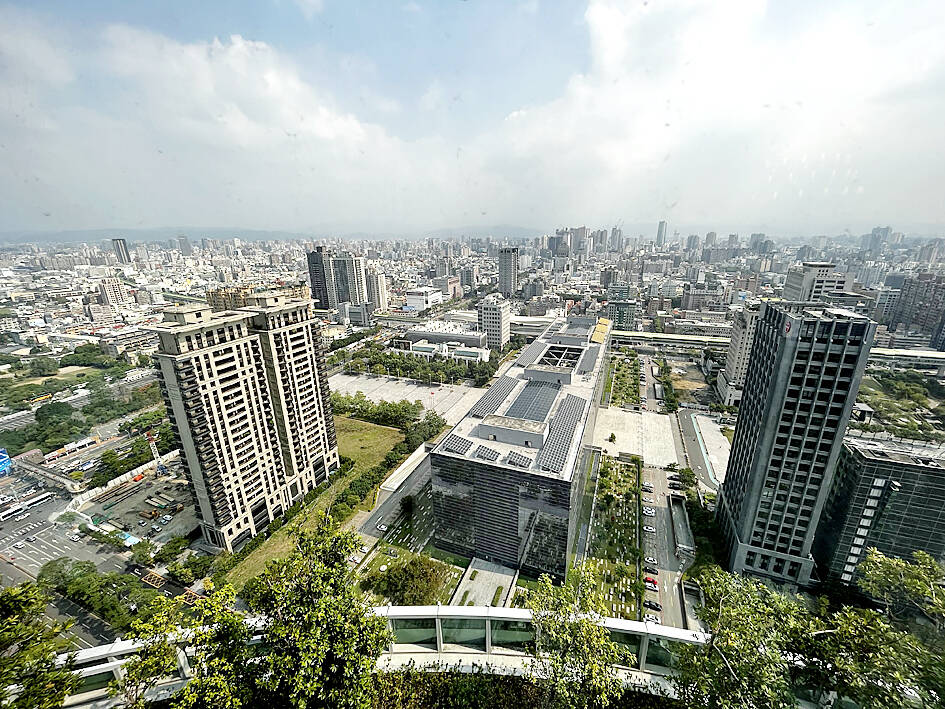Major property brokers reported a small monthly decline in housing transactions last month, but an annual drop of about 30 percent, dashing hopes of a high season, due to economic uncertainty and unfavorable legislation.
H&B Realty Co (住商不動產), Taiwan’s largest broker by the number of franchises, said deals last month declined 2.3 percent from November, which it blamed on an economic slowdown and interest rate hikes.
The decline was most evident in Taipei with a 10.9 percent drop, followed by New Taipei City, which fell 7.9 percent, and Taoyuan, which declined 5.7 percent, H&B Realty said.

Photo: Hsu Yi-ping, Taipei Times
The housing market in central and southern Taiwan fared more resilient, it said.
Taichung logged a 0.8 percent monthly drop, while deals in Tainan and Kaohsiung gained 9.2 percent and 1.5 percent respectively, H&B Realty said.
“Buying interest remains weak overall, even though the monthly figure in Tainan has increased for the past three months,” H&B chief researcher Jessica Hsu (徐佳馨) said.
Transactions in all six special municipalities slumped by double-digit percentages from a year earlier, Hsu said.
Transactions last year plummeted 46.1 percent annually in Kaohsiung, fell more than 30 percent in Taoyuan and Taipei, and retreated more than 20 percent in Tainan and Taichung, she said.
Evertrust Rehouse Co (永慶房屋), Taiwan’s largest broker by the number of offices, said its transactions last month rose 2 percent from November, but fell 32 percent from a year earlier.
People turned hesitant about property purchases after major economic indicators slipped into the contraction zone, while the central bank signaled further interest rates hikes if inflation remains high, Evertrust Rehouse deputy research head Chen Chin-ping (陳金萍) said.
Unease deepened after the legislature’s Internal Administration Committee last month approved bills that ban the transfer of presale housing contracts and subjects legal entities to prior approval before they can buy real estate, Chen said.
The unfavorable macro-environment is why transactions last year likely fell from 2021 and could shrink further this year, Chen said.
Price corrections for presale contracts would occur once the proposed bans take effect, driving investors off the market or have them lock their capital for a long period, Evertrust said.
Sinyi Realty Inc (信義房屋), Taiwan’s only listed broker, said that consideration periods became longer last month.
However, transactions of apartments priced NT$10 million to NT$25 million (US$325,648 to US$814,000) in Taipei held relatively stable, as well as those priced NT$10 million to NT$15 million in New Taipei City, Sinyi research manager Tseng Ching-der (曾進德) said.

Nvidia Corp chief executive officer Jensen Huang (黃仁勳) on Monday introduced the company’s latest supercomputer platform, featuring six new chips made by Taiwan Semiconductor Manufacturing Co (TSMC, 台積電), saying that it is now “in full production.” “If Vera Rubin is going to be in time for this year, it must be in production by now, and so, today I can tell you that Vera Rubin is in full production,” Huang said during his keynote speech at CES in Las Vegas. The rollout of six concurrent chips for Vera Rubin — the company’s next-generation artificial intelligence (AI) computing platform — marks a strategic

Enhanced tax credits that have helped reduce the cost of health insurance for the vast majority of US Affordable Care Act enrollees expired on Jan.1, cementing higher health costs for millions of Americans at the start of the new year. Democrats forced a 43-day US government shutdown over the issue. Moderate Republicans called for a solution to save their political aspirations this year. US President Donald Trump floated a way out, only to back off after conservative backlash. In the end, no one’s efforts were enough to save the subsidies before their expiration date. A US House of Representatives vote

Shares in Taiwan closed at a new high yesterday, the first trading day of the new year, as contract chipmaker Taiwan Semiconductor Manufacturing Co (TSMC, 台積電) continued to break records amid an artificial intelligence (AI) boom, dealers said. The TAIEX closed up 386.21 points, or 1.33 percent, at 29,349.81, with turnover totaling NT$648.844 billion (US$20.65 billion). “Judging from a stronger Taiwan dollar against the US dollar, I think foreign institutional investors returned from the holidays and brought funds into the local market,” Concord Securities Co (康和證券) analyst Kerry Huang (黃志祺) said. “Foreign investors just rebuilt their positions with TSMC as their top target,

REVENUE PERFORMANCE: Cloud and network products, and electronic components saw strong increases, while smart consumer electronics and computing products fell Hon Hai Precision Industry Co (鴻海精密) yesterday posted 26.51 percent quarterly growth in revenue for last quarter to NT$2.6 trillion (US$82.44 billion), the strongest on record for the period and above expectations, but the company forecast a slight revenue dip this quarter due to seasonal factors. On an annual basis, revenue last quarter grew 22.07 percent, the company said. Analysts on average estimated about NT$2.4 trillion increase. Hon Hai, which assembles servers for Nvidia Corp and iPhones for Apple Inc, is expanding its capacity in the US, adding artificial intelligence (AI) server production in Wisconsin and Texas, where it operates established campuses. This